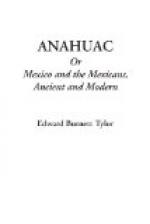The Mineria, or School of Mines, is a fine building, something after the manner of Somerset House on a small scale. As for the famous Plaza Mayor, the great square, it is a very great square indeed, large enough to review an army in, and large enough to damage by its size the effect of the cathedral, and to dwarf the other buildings that surround it into mere insignificance. However, one thing is certain, that we have not come all this way to see Spanish architecture and great squares, but must look for something more characteristic.
I have said we arrived in Mexico on the eve of Palm Sunday, and next morning we proceeded to consult with one of our newly-made acquaintances as to our prospects for the ensuing Holy Week. This gentleman, a man who took a practical view of things, mentioned a circumstance which led him to expect that the affair would go off with eclat. The Mexicans, both the nearly white Mestizos and the Indians of pure race, delight in pulque. The brown people are grave and silent in their sober state, but pulque stirs up their sluggish blood, and they get into a condition of positive enjoyment. But very soon after this comes a state of furious intoxication, and a general scuffle is a common termination to a drinking-bout. Fortunately, the Indians are not a bloodthirsty people; and, though every man carries a knife or machete, or—if he can get nothing better—a bit of hoop-iron tempered, sharpened, and fixed into a handle, yet nothing more serious than cuffs and scratches generally ensues. Even if severe wounds are given, the Indian has many chances in his favor, for his organization is somewhat different from that of white men, and he recovers easily from wounds that would kill any European outright.
The lower orders of the half-breed population are also given to pulque-drinking, but with far more serious consequences. Unlike the pure Indians, they are a hot-blooded and excitable race, and drunkenness with them is utter madness while it lasts. Knives are drawn at the very beginning of a squabble, and scarcely an evening passes without one or two bodies of men killed in these drunken melees being carried to the Police Cuartel in the great square. On Sundays and holidays the number increases; but on this Palm Sunday there were fourteen, not killed in one great battle, but brought in by ones and twos, from different parts of the city. It was this little piece of statistics that induced our friend to conclude that the citizens of Mexico had made up their minds to enjoy themselves thoroughly, and that Holy Week would be a grand affair. Monday, Tuesday, and Wednesday of the Semana Santa have only this to distinguish them from ordinary days, that the churches are crowded with men and women waiting their turn at the confessional; and that in the afternoons the old promenade of Las Vigas, down in the Indian quarter by the canal of Chalco, is patronized by fashionable Mexico, which, except on some four or five special




